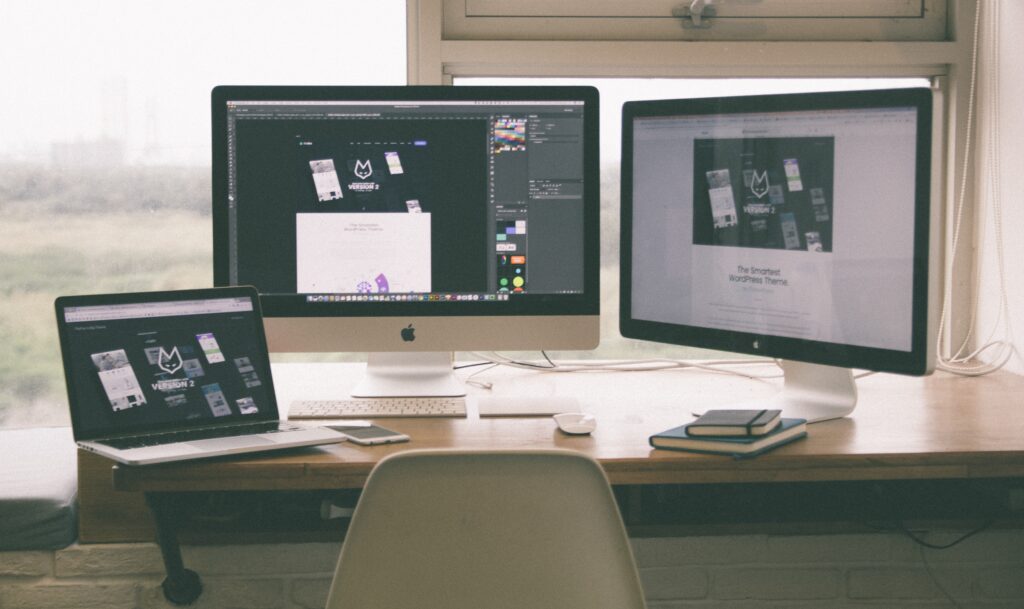
Digital Marketing
Digital marketing is a broad umbrella term that covers several areas from SEO to blogging and distribution channels to budgets. In this guide, we will help you understand the key pillars of digital marketing and enable you to create your own digital marketing strategy to optimize advertising through online channels such as search engines, your website, social media, email and mobile apps.
In this digital marketing guide, you’ll discover:
- What is digital marketing?
- How does digital marketing work?
- Why DM is important?
- The differences between B2B and B2C marketing
- The benefits of digital marketing
- Types of DM
1. What is digital marketing?
Digital marketing, also known as online marketing, refers to advertising delivered through digital channels to promote your brand and connect with potential customers over the internet and other forms of digital communication.
In-short, if a marketing campaign is using any of the below online media channels, it is digital marketing.
- Search engines
- Websites
- Social media
- Mobile apps
- Text messaging
- Web-based advertising
Consumers today rely heavily on digital means to research products. Some 77% of customers research a brand online before engaging with it, according to HubSpot Research. Meanwhile, 51% of consumers say they use Google to research products before buying.
2. How does digital marketing work?
Digital marketing uses a variety of strategies to reach customers, such as tempting them into making a purchase, building brand awareness, or simply reaching out to your brand. Modern DM includes a wide range of channel systems, which are the following:
- Social media
- Content marketing
- Website marketing
- SEO (search engine optimization)
- PPC (pay per click) advertising
To realize the true potential of digital marketing, marketers must delve deep into today’s vast and complex cross-channel world and discover strategies to make an impact through engagement marketing.
Engagement marketing is the practice of creating meaningful interactions with prospects and repeat customers based on data collected over time. By engaging customers in the digital landscape, increases brand awareness, positions them as a leader in sports, and puts your business at the forefront when customers are ready to buy.

3. Why is digital marketing important?
By implementing an cross-channel digital marketing strategy, marketers gain valuable insight into audience behavior while opening the door to new ways of customer engagement.
Additionally, businesses can expect increased customer loyalty. According to Investp’s report, companies with strong omnichannel customer retention strategies retain an average of 89% of their customers. Retention rates are only 33% when compared to companies with weak cross-channel programs.
Digital marketing is evolving. For example, the growing variety of portable his devices available to consumers offers new ways to market them. Forbes also predicts that B2B social media will become more conversational, video content will become more sophisticated for search engine optimization (SEO), and email marketing will become more personalized.
“Digital is at the core of everything in marketing today — it has gone from ‘one of the things marketing does’ to ‘THE thing that marketing does.’”
4. The differences between B2B and B2C marketing.
You may have heard of B2B and B2C, but do you know the difference between them? B2B is business-to-business and B2C is business-to-consumer, so you can customize your marketing efforts and should be targeted to.
Language and messaging:
B2B marketing focuses on contacting and transacting directly with other businesses, while B2C marketing targets consumers and customers instead.
For example, B2B marketing tends to focus on messages that use professional language and industry jargon to educate potential prospects. B2C marketing can focus on engaging customers, building brand awareness, and telling stories.
Decision-making:
Another important difference is the decision-making process. B2C allows customers to make purchasing decisions relatively quickly. Of course, you first need to earn trust through your digital marketing strategy.
However, one person is often the sole decision maker, especially if you sell items such as clothing or kitchenware. For large ticket items such as vacations, things can get even more complicated. But the purchasing process is faster and less complicated.
In B2B marketing, companies may need to persuade multiple stakeholders. You can sell building materials directly to large construction companies and compete with similar suppliers.
5. The benefits of digital marketing.
Of course, Digital marketing can help you know your target audience, get key information, and provide metrics that give your marketing team confidence. The benefits of digital marketing are:
1. You will get to know your audience.
Digital marketing offers the perfect way to get to know and connect with your audience. Test your offers and news to understand peak hours when they visit your website. If you have a social media strategy in place (and you should), you can build relationships with them faster and easier. Build credibility to tune in to your audience and differentiate yourself from your competitors.
2. It doesn’t cost much.
Compared to traditional marketing methods, digital marketing is cheap. Less overhead. You can use one of our many templating systems to create a sleek and professional website at relatively low cost, or you can pay extra for a bespoke creation. Create a social media account for free and partner with an email newsletter provider for a low price. Relatively inexpensive digital marketing is also suitable for small businesses.
6. Types of digital marketing.
Digital marketing involves a vast network of digital touchpoints that customers interact with many times a day. To use each of these channels properly, you need to understand each one.
1. Paid search.
Paid search, also known as pay-per-click (PPC) advertising, usually refers to sponsored results at the top or side of a search engine results page (SERP). These ads are charged per click and can be customized to appear when specific search terms are entered.
Advantage: Ads are basically targeted to an audience searching for a specific product or item. These advertisements therefore rely on data collected from an individual’s online behavior and are used to increase website traffic by delivering relevant advertisements to the right people at the right time. , is very effective. These ads also include retargeting. This means marketing automation tools can create unique, personal cross-platform ads based on customer behavior.
Disadvantages: of PPC include cost and effort. You can choose what to use, but the cost can add up quickly. Campaigns can be very time-consuming and often require monitoring and optimization.
2. Search engine optimization (SEO).
SEO is the process of optimizing a website’s content, technical settings, and reach to ensure that your page appears at the top of search engine results pages for a specific set of keywords. You can also rank your content or products with the help of SEO.
Advantage: However, the organic online traffic generated by SEO has a huge impact on your search rankings, resulting in organic website traffic. By using keywords and phrases, you can use SEO to significantly increase your visibility and start a lasting customer relationship. SEO is defined as using popular keywords and phrases to increase your website’s ranking in online search results and, as a result, increase your organic website traffic. Visibility is the first step to building lasting customer relationships, so a strong SEO strategy will have a big impact on your digital marketing campaigns.
Disadvantages: but, the website doesn’t see much change immediately after implementing his SEO strategy, so patience is required. Google’s algorithm updates can also affect rankings. This may mean that you need to change your strategy.
3. Social media marketing.
Perhapse Social media is everywhere, so your business needs to be active on multiple different platforms. However, having a few social media accounts is not the only key to effective social media marketing.
Advantage: Social channels should be used appropriately and effectively. The more your audience engages with your content, the more likely they are to share it and potentially encourage their peers to become customers as well.
Disadvantages: Varying content across platforms has its benefits. What works well on Twitter may not work as well on the more visual Instagram. A common mistake for businesses that use social media is not posting often or completely misreading the tone of their posts. Again, understand your audience and what they want. You can sell your digital marketing skills on online platforms. If still you are not satisfied then you can check other freelancing skills.
Now you have learned how to do digital marketing so now you have to learn how you will grab new clients.


